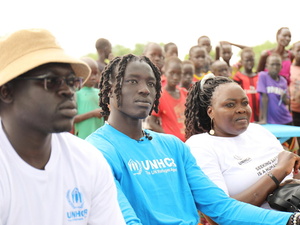Timor Emergency Update
Timor Emergency Update
West Timor
Militia gunmen opened fire in the air before a departing convoy and in front of the UNHCR office in the West Timor border town of Atambua in two incidents on Thursday apparently aimed at disrupting UNHCR's repatriation programme to East Timor.
In the morning, gunmen jumped off a jeep as a convoy of seven trucks carrying 200 returnees set out from Lakafehan camp on the outskirts of Atambua and fired their guns. Police escorting the convoy intervened but made no effort to arrest the gunmen.
In the second incident in the afternoon, seven plainclothes men at a soccer field across the UNHCR office fired 30 rounds with their automatic rifles for 90 minutes.
There were no injuries reported in the two incidents. The convoy proceeded to Atapupu 25 kilometres north of Atambua and joined two ferries that later in the day transported 1,007 refugees to Dili in East Timor.
Thursday's incidents followed harassment of UNHCR staff conducting repatriation earlier in the Atambua area. On Monday, militiamen grabbed an international staff member by the neck and threatened several local workers at the Halewen camp beside the Atambua airport following their arrival to transport refugees.
Since the return programme by boat started in Atapupu on 28 October, 5,252 refugees have returned to Dili. UNHCR staff have gone into 20 refugee sites in the Atambua area along the border with East Timor, arranging transport to the Atapupu port for people who wish to go back.
This has caused tension and anger among the militia groups operating in West Timor. UNHCR staff fear the situation will deteriorate further unless Indonesian officials step in to control militia activity.
Despite the incidents, UNHCR staff continue efforts to repatriate those volunteering to go back before the approach of the rainy season, when access to the interior becomes more difficult. UNHCR has been exploring the possibility of overland returns. Only one return overland, involving more than 100 returnees, has taken place. The main problem is security along the 4-kilometre stretch of no man's land between East and West Timor. Discussions between representatives of the Indonesian military and the International Force on East Timor (Interfet) on who will take responsibility for security in the no man's land are continuing and some progress has been reported.
East Timor
UNHCR staff who went to the Ambeno enclave this week report that many of the 44,000 refugees outside the area will probably return once the Indonesian army opens the border. Ambeno is an East Timor enclave in northern West Timor.
Most of the refugees from Ambeno are with host families in several dozen villages and in the main township of Kafamenanu, 120 km north-east of the West Timor capital, Kupang.
There are two makeshift camps of tarpaulin and barracks of galvanized iron and plywood at Wini, housing 3,000-4,000 refugees mainly from Liquicia in the interior of East Timor, and another at Naen, sheltering 4,000 people from Ambeno. These sites are near the army checkpoints leading to the enclave.
UNHCR staff who reached Oesilo inside Ambeno were told by an Interfet officer on Wednesday that 100 refugees had entered the area earlier in the day. UNHCR was told that militiamen in the refugee hosting areas, identified by the red and white Indonesian flags on their huts, were discouraging returns. Some militiamen have indicated willingness to return but are reportedly concerned about what action Interfet will take against them.
But with most refugees living with host families, repatriation can be less intimidating for those who want to go back as long as the borders are open and security along the roads is assured.
Meanwhile, UNHCR staff based in Maliana in East Timor report that 700-1,000 refugees are returning daily on their own from West Timor through the Soso area south of Atambua. They are reportedly registering with local authorities in the West Timor villages and are then escorted to the border by police and militiamen.









